Rondane National Park is Norway's oldest national park and covers the Rondane mountain range in Oppland and Hedmark counties in Norway. The area include some of the highest mountains in Norway and is an important habitat for wild reindeer. Rondane lies just to the east of Gudbrandsdal and adjacent to Dovrefjell another key mountain area.
This mountain area inspired painters and poets, some of Norway's key paintings and poems captures the Rondane experience.
Understand
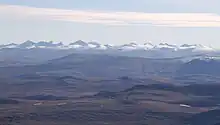
While the area is protected as a national park, there are no specific services. There are no gates, fences or guards.
Landscape
|
At Rondane (poem by Vinje) Now I see the same mountains and valleys, |
Rondane is a typical high mountain area, with large plateaus and a total of ten peaks above 2,000 m (6,560 ft). The highest point is Rondeslottet ("The Rondane Castle") at an altitude of 2,178 m (7,146 ft). The lowest point is just below the tree line, which is approximately 1,000 to 1,100 m (about 3,300 to 3,600 ft) above sea level. The climate is mild but relatively arid. Apart from the White Birch trees of the lower areas, the soil and rocks are covered by heather and lichen, since they lack nutrients. The largest mountains are almost entirely barren; above 1,500 m (5,000 ft) nothing but the hardiest lichens grow on the bare stones.
Rondane is part of a high plateau that stretches from the edge of the great western fjords at Åndalsnes and Sunndal to the hinterland of Lillehammer where the high plateau gradually changes into forested hills and bogs.
History
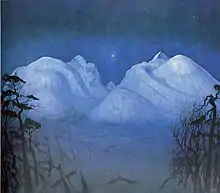
Rondane is Norway's oldest national park, created in 1962 "to safeguard the natural environment with its native plants, animal life, and cultural heritage and also to secure the environment as a recreational area for future generations". The protected area was notably enlarged in 2003 and now covers some 1000 km2, an adjacent area at Dovrefjell was also made national park such that all the mountain areas between roads E6 and 27 now enjoys protection.
Painter Harald Sohlberg made several versions of his now iconic image "Winter's Night in Rondane", a key painting in romantic tradition. The first lines of Aasmund O. Vinje's poem "At Rondane" is instantly recognized by Norwegians: "Once more such heights and valleys stand before me, as those I saw when my first youth held sway." Vinje's poem was inspired by Goethe and was published in Memories of the trip in summer 1860. Edvard Grieg set music to Vinje's lyrics. Storys and legends from Rondane inspired Henrik Ibsen's famous drama-poem "Peer Gynt".
Sigrid Undset's Kristin Lavransdatter visits Rondane:
- Kristin gazed with great eyes- never before had she dreamed that the world was so big and wide. Forest-shagged ranges lay below her on all sides; the valley was but a cleft betwixt the huge fells, and the side-glens still lesser clefts; there were many such, yet was there little of dale and much of fell. All around grey peaks, flaming with golden lichen, rose above the sea of forest, and far off, on the very brink of heaven, stood blue crests flashing here and there with snow, and melting, before their eyes, into the grey-blue and pure white summer clouds. But north-eastwards, nearer by- just beyond the woods- lay a cluster of mighty slate-coloured domes with streaks of new-fallen snow down their slopes.
Flora and fauna
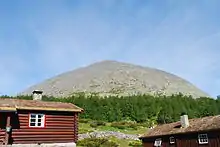
Vegetation is generally poor in plant species, with some areas are richer than others. Lichen, a fine cross between an algae and a fungus, is the key vegetation of Rondane. The map lichen with their yellowish green markings across the rocks can be seen everywhere. Reindeer lichen (light and grey) and other types of lichen (e.g. Cladonia stellaris) create the characteristic lichen mats that serve as food for the reindeer during the winter months in places where the wind blows away most of the snow.
Climate
Rondane has a dry climate and low temperatures during the winter. The winters are stable with long periods of cold weather. Rondane has large areas of permafrost such that only the uppermost layer of soil defrosts during the summer months. Rondane is one of the driest places in Norway, annual precipitation is only 400-600 mm and very little snowfall in the northern corner of the area.
Get in
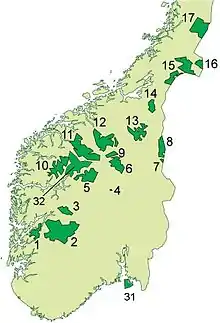
- Road 27 (national tourist route) runs along the southern/eastern edge of the area through the Venabu plateau (Ringebufjellet).
- Parking area along road 27
- Road to Dørålseter lodge (summer only), the starting point closest to the high summits
- Road E6 and Dovre railway line (direction Trondheim) runs along the western edge.
- Høvringen, Mysusæter and Rondablikk are high starting points close the edge of the area
- Grimsdalen road
Fees and permits
Everyone is free to enter on foot.
- Dogs must be kept on leash from 1 March to 20 August. Local municipal regulations also extend the leash law during the autumn season to protect local animals.
- Do not leave behind any traces of your visit – mountain nature is quite fragile.
- Off-road driving is strictly prohibited.
- Walk on marked trails and paths whenever possible.
- Do not disturb animals or birds.
- If you see a herd (reindeer in particular) in the distance, walk around with the wind direction from the herd in your face. If you surprise the animal, stay calm and let the reindeer pull away
- The mountain fox stock has either died out or is on the brink of extinction.
- There is a sustainable glutton (wolverine) stock.
Get around
There are no roads within the park itself. All transport is on foot. Horses and bicycles only along designated tracks.
See
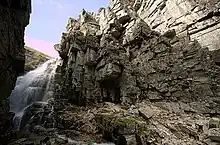
- Jutulhogget gorge (500 meters from Rondvasbu). A small gorge (canyon) near Rondvassbu lodge (not to be confused with the large canyon further east), some 20-30 m deep.
Do
- See also: Hiking in the Nordic countries
Buy
Eat
Drink
Sleep
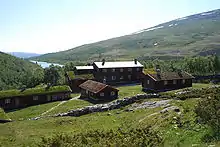
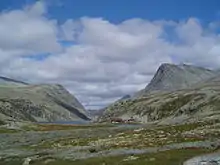
Lodging
The non-profit trekking association runs several lodges in the area, there are also private lodges.
Camping
Camping is usually allowed by the lodges, for a fee for using the facilities of the lodge.
Backcountry
Hikers can use their own tent in the wilderness, not closer than 150 m to huts and lodges.
Stay safe
Go next
- Dovrefjell mountains and national parks